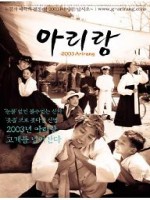130, Suyeonggangbyeon-daero,
Haeundae-gu, Busan, Republic of Korea,
48058
DATABASE
Arirang (2003)
< A-ri-rang >
Young-jin, the film's protagonist, is mentally unstable, the result of his arrest and torture by the Japanese police for leading pro-Korean protests. Gi-ho, the son of Sang-min, landlord of the farm where Young-jin’s family works, relentlessly pursues Young-jin’s younger sister, Young-hee. As time goes on, the behavior of both Sang-min and Gi-ho becomes increasingly oppressive. One day when the town is celebrating its harvest festival, Gi-ho attempts to rape Young-hee. I...more
| Genre | Drama | Production Status | Released |
|---|---|---|---|
| Running Time | 83min | Release Date | May 30, 2003 |
| Country | South Korea | Rating | ALL |
| Language | Co-Production | N | |
| Original |
-
Number of Screens : 1
-
Total Admissions : 0
-
Total Gross : $0
As of Dec 20, 2025
-
Siori Entertainment | poodom@lycos.co.kr
- Republication, copying or redistribution by any means is prohibited without the prior permission of KOFIC and the original news source.




















